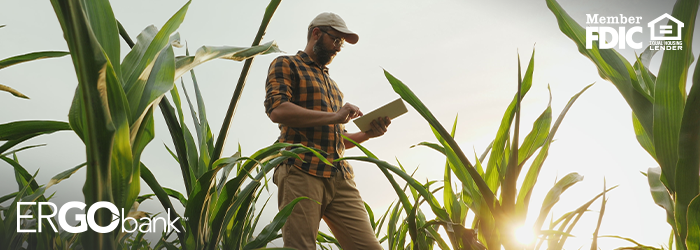
Farming is a way of life — and a noble one at that. But whether you’re growing crops, raising livestock, or running a small family farm, keeping your operation going takes more than just hard work. It requires the right financial tools to buy land, upgrade equipment, and manage the ups and downs of the industry.
If you’re looking for ways to finance your farm in Wisconsin, this guide breaks down the best options, from land loans and equipment financing to farm operating lines of credit. Let’s dig in!
1. Farm Loans: The Backbone of Agricultural Financing
Most farmers don’t have the cash on hand to buy land, expand operations, or invest in major upgrades — that’s where farm loans come in. The right loan can help you grow your business while keeping cash flow stable.
Types of Farm Loans Available in Wisconsin
- Farmland Loans – Need to buy land to start or expand your farm? A farmland loan helps you purchase property for crops, livestock, or future development.
- Equipment Loans – Tractors, combines, irrigation systems… farming requires a lot of machinery, and equipment loans help you finance new or used equipment with manageable payments.
- Farm Operating Loans – These short-term loans provide working capital for seed, feed, fertilizer, fuel, and labor costs — helping you cover seasonal expenses.
- Rural Property Loans – Whether you're buying hunting land, recreational land, or a hobby farm, specialized loans can help you finance properties that don’t fit traditional mortgage requirements.
Beginning Farmer Program – If you're new to farming, Ergo Bank, in conjunction with the Farm Service Agency (FSA), offers the Beginning Farmer Program. This program provides access to capital for renovations, land purchases, and long-term fixed-rate loans — all with low down payments and flexible terms.
50-50 Program – Not a first-time farmer but still need financing? The 50-50 program splits funding between the FSA (50%) and Ergo Bank (50%), giving more farmers access to affordable financing.
Interested in these programs? Contact Ergo Bank to learn how they can help you buy land and grow your farm.
2. How to Qualify for a Farm Loan
Before applying for a loan, it helps to understand what lenders look for. While every bank has different requirements, here are some key factors:- Credit Score – A strong credit history makes it easier to get approved and to qualify for lower interest rates.
- Farm Experience & Business Plan – If you’re starting fresh, lenders may want to see a solid plan outlining your operation’s income potential.
- Down Payment – Some farm loans require a 10–25% down payment, depending on the loan type.
- Collateral – Land, equipment, or livestock may be used as loan collateral.
Local Banking Perk: At Ergo Bank, we don’t treat farmers like numbers. We take the time to understand your farm, your needs, and your future goals, helping you find financing that works for you.
3. Understanding Loan Terms & Interest Rates
Farm loans come with different repayment terms and interest rates, so it’s important to pick the right fit.
- Fixed-Rate Loans – Your interest rate stays the same for the life of the loan, providing predictable payments.
- Variable-Rate Loans – The rate fluctuates with the market, which could mean lower payments at times but higher costs if rates rise.
- Short-Term vs. Long-Term Loans –
- Short-term loans (1–5 years) are great for seasonal expenses or equipment upgrades.
- Long-term loans (10–30 years) are ideal for buying land or major expansions.
Tip: If you’re buying farmland, consider a longer loan term to keep payments manageable while land appreciates in value.
4. Managing Farm Finances & Cash Flow
Farming is seasonal, and cash flow management is key to surviving slow months and preparing for the next season.
Farm Budgeting Tips:
- Separate personal & farm finances – Keep farm income and expenses in a dedicated business account.
- Plan for slow seasons – Use an operating line of credit to cover costs between harvests.
- Track expenses & revenue – Knowing where your money is going helps you make smarter financial decisions.
- Build an emergency fund – Set aside cash for unexpected repairs, crop losses, or price fluctuations.
Pro Tip: Ergo Bank’s business banking services include farm-friendly checking and savings accounts designed to make money management easier for Wisconsin farmers.
5. Hunting, Recreational, & Rural Land Loans
Many farmers in Wisconsin don’t just run their farms — they also enjoy the outdoors and recreational land ownership. Whether you’re looking for hunting land, fishing retreats, or a weekend getaway property, local banks like Ergo Bank offer financing solutions for rural properties.
- Hunting & Recreational Land Loans – Perfect for those wanting to invest in land for hunting, fishing, or outdoor recreation. Learn more about hunting and recreational land loans today!
Why Choose Ergo Bank for Your Farm Financing?
At Ergo Bank, we understand that farming isn’t just a business — it’s a way of life. As a local Wisconsin bank, we offer:
- Personalized farm loans – We take the time to understand your operation and find the right financing solution.
- Hunting, recreational, and rural property loans – Whether it’s for work or play, we help you invest in the land you love.
- Local decision-making – No waiting on out-of-state approvals — we handle everything right here in Wisconsin.
- Flexible lending solutions – We offer farm operating loans, land loans, and equipment financing that make sense for rural life.
If you’re ready to finance your farm, expand your operation, or invest in rural property, our team is here to help.
Get started today — talk to a local lender who understands Wisconsin farming!